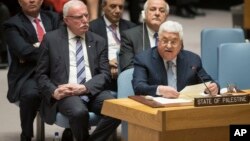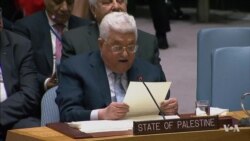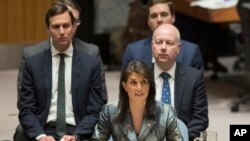Palestinian President Mahmoud Abbas is calling for an international peace conference to be convened by the middle of this year to try to break the impasse in the Middle East peace process.
“Confronted with this deadlock, we have neither given up, nor have we lost hope,” Abbas told the monthly meeting Tuesday of the U.N. Security Council on the Israeli-Palestinian issue.
The Palestinian leader expressed support for broad regional and international participation at such a meeting, and he laid out his vision of what he called a “peace plan.” His speech was the first time Abbas has addressed the 15-nation council since 2009.
His plan includes measures such as parties refraining from unilateral actions during negotiations, Israel’s cessation of settlement activity, and suspension of the U.S. decision to move its embassy from Tel Aviv to Jerusalem. For their part, the Palestinians would refrain from joining additional international organizations and treaties.
WATCH: A call for peace
Abbas added that once the Palestinian question is resolved, 57 Arab and Muslim countries would be ready to recognize the state of Israel.
“We are ready to begin negotiations immediately in order to achieve the freedom and independence of our people,” Abbas said.
The Palestinian president spoke to a packed council chamber in New York and his remarks were greeted with lengthy applause. As soon he finished speaking, Abbas left the room, skipping both the Israeli and U.S. ambassadors’ remarks, which, respectively, followed his.
Israel’s envoy seized on this, criticizing Abbas for “running away” and saying he is “no longer part of the solution,” but is part of the problem.
“Mr. Abbas came in, put his demands on the table and he left, and he’s expecting you to deliver the results,” Israeli Ambassador Danny Danon told council members. “It’s not going to work that way.”
Jerusalem Issue
President Abbas is still outraged over the Trump administration’s December decision to recognize Jerusalem as the capital of Israel, and move the U.S. embassy from Tel Aviv to Jerusalem, telling the council on Tuesday the move was “unlawful.”
“The United States knows the Palestinian leadership was very unhappy with the decision to move our embassy to Jerusalem,” an unapologetic Nikki Haley said. “You don’t have to like that decision. You don’t have to praise it. You don’t even have to accept it. But know this: that decision will not change.”
She said the Palestinians could choose to denounce the United States and reject its role as a peace broker, but that it would not get the Palestinian people any closer to realizing their aspirations.
“I sit here today offering the outstretched hand of the United States to the Palestinian people in the cause of peace,” Haley said. Sitting behind her were U.S. President Donald Trump’s son-in-law Jared Kushner, who is leading the White House’s Middle East peace efforts, and Trump’s Special Representative for International Negotiations, Jason Greenblatt.
A U.S. spokesperson said Tuesday there were no plans for any of the three officials to meet with Abbas while he is in New York.
Tensions have been growing between the Israelis and Palestinians, giving rise to fears it could lead to a new conflict. The humanitarian situation in the Gaza Strip also is becoming more severe, with power cuts running up to 20 hours per day. And as U.N. Secretary-General António Guterres warned Tuesday, the global consensus for a two-state solution could be eroding.
“Obstacles on the ground have the potential to create an irreversible one-state reality,” he said. “It is simply impossible to square the circle of a one-state reality with the legitimate national, historic and democratic aspirations of both Israelis and Palestinians.”
The U.N. chief urged a solution to address all final status issues, saying, “There is no Plan B.”







